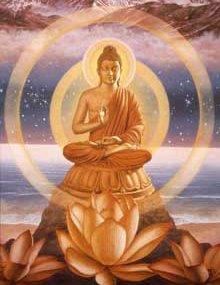“All research, especially that carried on lately in connection with the modern materialistic schools and with the fuller understanding of the mechanism of the human body, has tended to prove that the soul is a superstition, a defense mechanism, and that conscious thought with all the higher manifestations of the human mind (and hence also the lower expressions of personality, selfhood and conscious integration) can well be provided for and accounted for by man’s present equipment of brain, nervous system and the endocrine system. All these in their turn are understood to be the result of a long evolutionary and selective process.
The wonder of the machine itself is divine in its completion and in its scope. From a primeval germ, developing under the pressure of nature’s laws, and of environing conditions plus a consistent adaptation to requirements and a most careful selection, man has developed; he now possesses a mechanism which is responsive to the natural world, to sensation and to thought.
That which is called the soul is regarded frequently as the result of this selective process and as constituting the sum total of the responsive and discriminating powers of the cells and organs of the body, plus the life principle. All, we are told, is inherent in the parental germ, and the conditions of the environment, added to heredity and education, are sufficient to account for the phenomena of the human consciousness.
Man is a machine, a part of a still greater machine which we call nature, and both man and nature are run on immutable laws. There is no free will except within certain clearly defined limits, which are defined by equipment and by circumstance. There can be no immortality, for when the machine breaks down and disintegrates there is nothing left but the dissociated cells and atoms of which it was originally composed. When the principle of coherence or of integration ceases to function, that which it produced—the coherent functioning body—likewise ceases to function. Consciousness and choice, awareness and affection, thought and temperament, life and love, character and capacities—all disappear, and there is nothing left but the atoms of which the body had been composed. These in their turn are dissipated and disappear, and all has finally been reabsorbed into the general reservoir of forces and atoms.
“Of the countless millions of human beings who have lived and loved, suffered and rejoiced upon our planet, what is left today to guarantee to us their existence in the past, not to speak of their continuing existence in the present? A few bones, a few buildings, and, later, traces of their historical influence; later still, we note what they have left behind of beauty in the field of literature, of architecture, of painting, and in those forms in which they have embodied their thought and aspiration, their visions and their ideals. On the planet today we find a humanity at all stages of development, with mechanisms of varying kinds, adequate and inadequate.
We find all of them, without exception, breaking down under test and limited by disease, or hiding the seeds of disease; the perfect equipment is totally unknown, and every man harbors the germs of trouble. No man possesses a perfect mechanism, but owns one that must inevitably break down at some point that is conditioned by an under-developed or over-developed glandular system, that hides at some point inherited disease and racial weaknesses, and that fails somewhere, in some portion of the mechanism, to meet the needs (physical, emotional, and mental) of the day and hour. Of what does this speak? Of the sum total of the united cell life; of the environing group in which a particular form finds itself; of the life, impersonal and abstract in nature, which pervades it; of a vague group spirit that is expressing itself through the fourth kingdom in nature; of a temporary and impermanent self; or of an immortal entity who is the dweller in the body?
“Such are some of the questions which arise today; and in the last analysis, belief in the soul can be posited as being largely a matter of temperament, of the wish and desire of the ages wherein man struggled and suffered and relieved the strain of living by constructing a body of thought around a happy immortal being, who was to be free, eventually and finally, from all the difficulties of physical existence.
The soul can be regarded as a beautiful vision or as an hallucination, for all that tends to prove its existence is the testimony of the many mystics down the ages to a contact and an experience which can be accounted for in terms of dream life, of brain lesions or of escape reactions, but which rests on no sure foundation. So say the materialists and the upholders of proven scientific facts.”
Alice A. Bailey, Esoteric Psychology I pp 89-92

